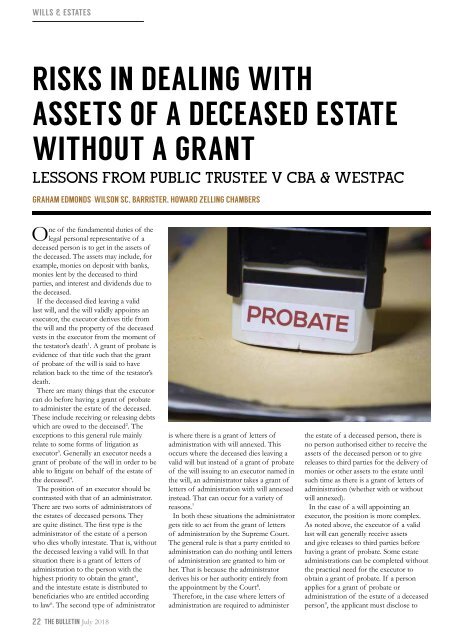LSB July 2018_Web
Create successful ePaper yourself
Turn your PDF publications into a flip-book with our unique Google optimized e-Paper software.
WILLS & ESTATES<br />
RISKS IN DEALING WITH<br />
ASSETS OF A DECEASED ESTATE<br />
WITHOUT A GRANT<br />
LESSONS FROM PUBLIC TRUSTEE V CBA & WESTPAC<br />
GRAHAM EDMONDS-WILSON SC, BARRISTER, HOWARD ZELLING CHAMBERS<br />
One of the fundamental duties of the<br />
legal personal representative of a<br />
deceased person is to get in the assets of<br />
the deceased. The assets may include, for<br />
example, monies on deposit with banks,<br />
monies lent by the deceased to third<br />
parties, and interest and dividends due to<br />
the deceased.<br />
If the deceased died leaving a valid<br />
last will, and the will validly appoints an<br />
executor, the executor derives title from<br />
the will and the property of the deceased<br />
vests in the executor from the moment of<br />
the testator’s death 1 . A grant of probate is<br />
evidence of that title such that the grant<br />
of probate of the will is said to have<br />
relation back to the time of the testator’s<br />
death.<br />
There are many things that the executor<br />
can do before having a grant of probate<br />
to administer the estate of the deceased.<br />
These include receiving or releasing debts<br />
which are owed to the deceased 2 . The<br />
exceptions to this general rule mainly<br />
relate to some forms of litigation as<br />
executor 3 . Generally an executor needs a<br />
grant of probate of the will in order to be<br />
able to litigate on behalf of the estate of<br />
the deceased 4 .<br />
The position of an executor should be<br />
contrasted with that of an administrator.<br />
There are two sorts of administrators of<br />
the estates of deceased persons. They<br />
are quite distinct. The first type is the<br />
administrator of the estate of a person<br />
who dies wholly intestate. That is, without<br />
the deceased leaving a valid will. In that<br />
situation there is a grant of letters of<br />
administration to the person with the<br />
highest priority to obtain the grant 5 ,<br />
and the intestate estate is distributed to<br />
beneficiaries who are entitled according<br />
to law 6 . The second type of administrator<br />
22 THE BULLETIN <strong>July</strong> <strong>2018</strong><br />
is where there is a grant of letters of<br />
administration with will annexed. This<br />
occurs where the deceased dies leaving a<br />
valid will but instead of a grant of probate<br />
of the will issuing to an executor named in<br />
the will, an administrator takes a grant of<br />
letters of administration with will annexed<br />
instead. That can occur for a variety of<br />
reasons. 7<br />
In both these situations the administrator<br />
gets title to act from the grant of letters<br />
of administration by the Supreme Court.<br />
The general rule is that a party entitled to<br />
administration can do nothing until letters<br />
of administration are granted to him or<br />
her. That is because the administrator<br />
derives his or her authority entirely from<br />
the appointment by the Court 8 .<br />
Therefore, in the case where letters of<br />
administration are required to administer<br />
the estate of a deceased person, there is<br />
no person authorised either to receive the<br />
assets of the deceased person or to give<br />
releases to third parties for the delivery of<br />
monies or other assets to the estate until<br />
such time as there is a grant of letters of<br />
administration (whether with or without<br />
will annexed).<br />
In the case of a will appointing an<br />
executor, the position is more complex.<br />
As noted above, the executor of a valid<br />
last will can generally receive assets<br />
and give releases to third parties before<br />
having a grant of probate. Some estate<br />
administrations can be completed without<br />
the practical need for the executor to<br />
obtain a grant of probate. If a person<br />
applies for a grant of probate or<br />
administration of the estate of a deceased<br />
person 9 , the applicant must disclose to


















